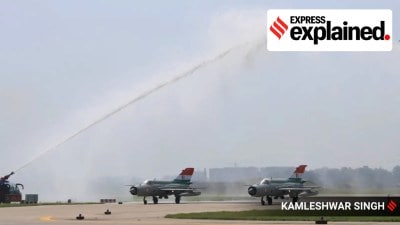US reworks Iraq resolution for UN support
The US informally circulated a new draft resolution on Iraq to key Security Council members on Wednesday with changes, including an unoffici...

The US informally circulated a new draft resolution on Iraq to key Security Council members on Wednesday with changes, including an unofficial timetable for Iraqi self-rule, designed to win troops and money for rebuilding Iraq.
While Washington is unwilling to give up much control or change the framework of a political transition, it is offering the compromises as a way to address demands by France and other countries for a quick shift of sovereignty. The new version of the proposal contains concessions designed to convince Iraqis and donors that the occupation is temporary, and that the country will be back in Iraqi hands soon. It does not set out a schedule for a political transition, instead asks the Iraqi Governing Council to come up with a timetable with guidance from the occupation authorities and the UN.
The Council may be able to provide a timetable that ‘‘is believable and can strive for what we want to achieve, but does not go into the Security Council resolution,’’ a senior US official said. ‘‘It would give others on the Security Council a sense of what we’re trying to do and when, but prevents us from being beaten over the head if the timetable doesn’t meet all its goals.’’
Instead of bowing to requests by France and others for an immediate restoration of Iraqi sovereignty, the US has stood by its sequence for a transfer of power: The drafting of a constitution, a referendum to ratify it, and eventual elections.
In response to Annan’s requests, the resolution attempts to more specifically define the role of the UN envoy and the mission in Iraq. It refers to the two sections of Annan’s July report on Iraq that outline the roles the UN can best play, including guiding the political transition, elections and continuing humanitarian work. The resolution portrays a multinational force as the backing for a smooth political process.
Although the international force would be under US command, it would also report to the Security Council every six months. While most council members agree that the US should command a force, few are willing to send troops to a hostile area if they are seen as part of an occupation force. ‘‘The only way to end opposition to the occupation is to end the occupation,’’ a council diplomat said.
Changing that perception is one crucial area in which the resolution falls short, diplomats say. After the bombing of UN headquarters in Iraq, Annan pleaded with Security Council ambassadors for an approach that would make it safe enough for UN and others to help rebuild the country. That would require ‘‘a radical change’’ in the Iraqi perception of the international presence in Iraq, he said, from occupation to stressing rebuilding. — LAT-WP






- 01
- 02
- 03
- 04
- 05

























